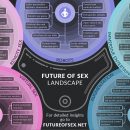Never Surrender, Dorthy: LGBTQ2+ Zine Uses Old Tech to Bypass New Intolerances
May also provide sex-info sites with a way to circumvent government censorship

New Sessions is a retro-text-based underground zine designed to be an online haven for today’s tragically at-risk queer community.
It was launched by Cara Esten Hurtle and Lo Ferris, and inspired by Hurtle’s deep dive into her collection of vintage computer hardware during the years of the COVID pandemic.
As early as 2023, the Human Rights Campaign (HRC) declared a national state of emergency in the United States: “More than 75 anti-LGBTQ+ bills have been signed into law this year alone, more than doubling last year’s number, which was previously the worst year on record.” The present administration’s alarmingly successful attempts to make life increasingly more dangerous for LGBTQ2+ individuals while also erasing queer history.
Though far from an ideal solution, as use depends on some knowledge of predominantly antiquated Internet technology, New Sessions could inspire the growth of similarly innovative approaches to many at-risk communities—including frequently targeted groups such as sexual health experts and educators, as well erotic artists and writers lacking a platform.
“We have all been forced to adapt.”
Differing from most other digital platforms, New Sessions is Telnet-based, an admittedly outdated, if not nearly obscure technology. However, a special client program provides access, or if you’re an aficionado of vintage systems like its creators, Hurtle and Ferris, via a computer’s software command line.
In either case, New Sessions’ fascinating adaptability is also unique; its text, whether a story, poem or whatever else, comprises its current issues, changing according to an array of factors.
RECOMMENDED READ: Tariffs and Sextech Costs—Oh My!
404Media, for instance, notes, “Natasja Kisstemaker’s ‘Sanctuary’ changes with every viewing, based on the current weather. ‘Signature,’ by Kaia Peacock, updates every time you press a key, slowly revealing more of the piece when you type a letter contained in the text—like a word puzzle on Wheel of Fortune.”
Politically, New Sessions is out and proud, as its Adaptations issue boldly pronounced: “In the face of right-wing politics, climate change, a forever pandemic, and the ever-present hunger of imperialist capitalism, we have all been forced to adapt.”
“We can take and claim for our own”
Speaking to 404Media, Hurtle, who’s also an artist and software engineer, explained the origins of New Sessions as a place “Where you don’t necessarily feel like you have to spend a ton of time with it. I want people to come back to it because they’re interested in the stories in the same way you’d come back to a book—not to get your streak on Duolingo.”
For someone who clearly enjoys dabbling in decades-old technology, Hurtle doesn’t want to look back at the so-called good old days with rose-colored … not so much spectacles as blinders, saying, “You have to avoid the temptation to nostalgize, because that’s really dangerous and it just turns you into a conservative boomer.”
Rather, New Sessions should be an alternative resource for the queer community, “Imagine what aspects of this we can take and claim for our own. We can use it as a window to understand what’s broken about the current state of the Internet. You just can’t retreat to it.”
Far, Far, below the radar
The New Sessions approach could be useful to creators and consumers of adult materials, another group too often in the crosshairs of social conservatives..
Case in point, Newsweek reported this social media post from Republican Utah Senator Mike Lee—one of adult entertainment’s most vehement adversaries—regarding the new Federal anti-pornography law he’s attempting to ram through, “Obscenity is not protected by the First Amendment. But hazy, unenforceable definitions have allowed pornography companies to infect our society, peddle smut to children, and do business across state lines unimpeded.”
Putting aside the obvious won’t somebody think of the children? appealing to emotional logical fallacy, many mental health professionals agree with Psychology Today that:
Over recent years, numerous studies have begun to suggest that there is more to the story than just porn. Instead, we’ve had growing hints that the conflicts and struggles over porn use have more to do with morality and religion, rather than pornography itself.
Not that science has ever stopped conservative hysteria. Still, thanks to out-of-the-box thinkers like Hurtle and Ferris, crucial sexual and reproductive health information, not to mention people who merely like to create or enjoy erotic media, may find safety where others can’t imagine where to look: in the nearly-lost, waiting to be rediscovered, depths of the Internet.
Image Sources: Depositphotos

















